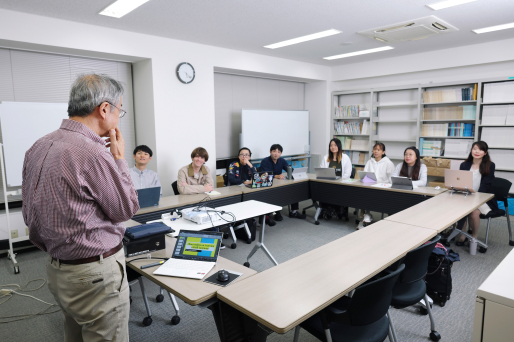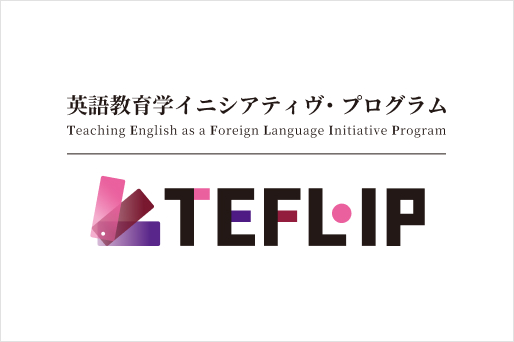TESOL (Teaching English to Speakers of Other Languages) Course
The Master’s Program in TESOL aims at educating and training pre-service and in-service teachers teaching English as a Foreign Language (EFL). The program emphasizes theoretical as well as practical aspects of English education with a view to helping students develop the type of professionalism that will enable them to cater to the needs of students studying in an EFL environment. One of the unique aspects of our program is that most of the courses are offered in English, thereby providing an ideal environment for students who wish to polish up their teaching expertise. This program attracts students from different parts of the world, which helps create an international environment, which helps students realize the global nature of our profession. Most of the graduates choose to work as practicing teachers in Japan and other parts of the world, whereas some of them enter PhD programs to enhance their academic careers. As such, our program presents unique educational experiences for students as they try to make a substantial contribution to English education in various parts of the world.

Teaching English as a Foreign Language Initiative Program
The TEFL-IP (Teaching English as a Foreign Language Initiative Program) was adopted as a “Graduate
School Networking Project in Humanities and Social Sciences” by MEXT in FY 2023. This project is a
collaboration among three graduate schools with advanced TEFL programs; Tokyo University of Foreign
Studies, University of Tsukuba, and Sophia University. The TEFL-IP offers a joint curriculum in Applied
linguistics, encompassing evidence-based TEFL and related interdisciplinary areas. It is primarily focused
on the master’s program and will be extended to the doctoral program in the future.

Curriculum
修了に要する科目,単位数,科目数などの要件
| 要件項目名 Core curriculum | 必要単位数 Credits | 必要科目数 Number of courses | 備考(上限、その他) Notes |
|---|---|---|---|
| 総単位数/Total credits | 30 | ||
| ‣選択必修科目(必修)/Compulsory elective courses | 8 | ||
| ┗Introduction to Linguistics | 2 | ||
| ┗Introduction to TEFL in Japan | 2 | ||
| ┗Second Language Acquisition(English) | 4 | ||
| ‣選択科目/Elective courses | 22 | ||
| ┗自専攻自コース科目 | 12 | ||
| ┗Core Courses | 4 | ||
| ┗Integrative Seminar in TESOL 1(Core Topics) | 4 | ||
| ┗Integrative Seminar in TESOL 2(Related Topics) | 4 | ||
| ┗Special Topics in Linguistics | |||
| ┗委託聴講科目/Other university courses under auditing agreement | 4単位まで修了に必要な単位として認められる。 ※ただし、国連大学委託聴講科目は認められない。 Up to 4 credits may be accepted for completion (Special Topics in Linguistics). However, courses offered at the United Nations University are not acceptable. | ||
| ┗自専攻他コース科目 | |||
| 研究指導(必修)/Thesis Guidance(Compulsory) | 2 | 単位なし、2年次以降に毎学期自動的にLoyolaに登録される 2科目以上合格すること No credits are given in this course. The course is automatically registered every semester after second year. The students must receive passing grades at least over 2 semesters. | |
| 修士論文/Master’s Thesis | 必要な研究指導を受けた上、修士論文の審査および試験に合格すること(修士論文を提出する学期の履修登録期間に必ず自身でLoyolaにおいて修士論文を登録すること) The student must receive supervision in the Thesis Guidance course and pass oral and written exams of his/her Master’s Thesis. The student must register this course during the registration period of the semester he/she will submit his/her thesis. ※Students who wish to complete the graduate program in september must register Master’s thesis at the Academic Affairs counter of the center for Academic Affairs. |
Organization of courses and credits
| 科 目 名 | 単 位 数 | ||
|---|---|---|---|
| 必修 | 選必 | 選択 | |
| <Core Courses> | |||
| Introduction to Linguistics | 2 | ||
| Introduction to TEFL in Japan | 2 | ||
| Second Language Acquisition(English) | 4 | ||
| Issues in Linguistic Diversity for the L2 Classroom | 2 | ||
| Listening and Speaking | 2 | ||
| Reading and Writing | 2 | ||
| Classroom Research | 2 | ||
| Affective Factors in TESOL | 2 | ||
| Curriculum and Syllabus Design | 2 | ||
| Materials Development | 2 | ||
| Principles and Practice of CLIL | 2 | ||
| Thesis Writing | 2 | ||
| <Integrative Seminar in TESOL 1(Core Topics)> | |||
| Focus on Form:Theory、 Research、 and Practice | 4 | ||
| Action Research | 4 | ||
| Classroom Discourse | 2 | ||
| 言語テスティング 1 /Language Testing 1 ※注1 | 2 | ||
| 言語テスティング 2 /Language Testing 2 ※注1 | 2 | ||
| <Integrative Seminar in TESOL 2(Related Topics)> | |||
| Bilingual Education | 2 | ||
| Intercultural Interaction | 2 | ||
| Analyzing Spoken Data | 2 | ||
| Psycholinguistics | 2 | ||
| Psycholinguistics ※注1 | 2 | ||
| Corpus Linguistics ※注1 | 2 | ||
| Sociolinguistics ※注1 | 2 | ||
| Sociolinguistics | 2 | ||
| Postmodern Approaches to SLA | 2 | ||
| Qualitative Research Methods | 2 | ||
| Language and Power | 2 | ||
| Theories of Teaching English to Young Learners | 2 | ||
| Practicum in Teaching English to Young Learners 1 | 2 | ||
| Practicum in Teaching English to Young Learners 2 | 2 | ||
| 実験統計法1 /Research Statistics 1 ※注1 | 2 | ||
| 実験統計法2 /Research Statistics 2 ※注1 | 2 | ||
| フランス語教授法1 ※注1 | 2 | ||
| フランス語教授法2 ※注1 | 2 | ||
| 日本語教育文法Ⅰ ※注2 | 2 | ||
| 日本語教育文法Ⅱ ※注2 | 2 | ||
| 第二言語習得Ⅰ ※注2 | 2 | ||
| 第二言語習得Ⅱ ※注2 | 2 | ||
| 言語・文化・社会 ※注2 | 2 | ||
| 日本語教授法概論 ※注2 | 2 | ||
| 日本語教育文法演習 ※注2 | 2 | ||
| 第二言語習得演習 ※注2 | 2 | ||
| 中間言語語用論概論 ※注2 | 2 | ||
| 中間言語語用論演習 ※注2 | 2 | ||
| 談話分析 ※注2 | 2 | ||
| 日本語評価法 ※注2 | 2 | ||
| 日本語教授法(初級) ※注2 | 2 | ||
| 日本語教授法(中上級) ※注2 | 2 | ||
| 日本語音声学 ※注2 | 2 | ||
| 日本語教材・教具論 ※注2 | 2 | ||
| 日本語社会言語学 ※注2 | 2 | ||
| 研究法入門 ※注2 | 2 | ||
| 異文化コミュニケーション ※注2 | 2 | ||
| 日本語研究Ⅰ ※注2 | 2 | ||
| 日本語研究Ⅱ ※注2 | 2 | ||
| 日本語教授法演習 ※注2 | 2 | ||
| 応用心理言語学 ※注2 | 2 | ||
| 日本語教育語彙 ※注2 | 2 | ||
| 日本語習得研究Ⅰ ※注2 | 2 | ||
| 日本語習得研究Ⅱ ※注2 | 2 | ||
| <Special Topics in Linguistics> | |||
| World Englishes | 2 | ||
| Corpus Linguistics | 2 | ||
| 音声学・音韻論基礎 ※注1 | 4 | ||
| 統辞論基礎 ※注1 | 4 | ||
| 意味論基礎 ※注1 | 4 | ||
※1:Courses offered by the Department of Linguistics.
※2:Courses offered by the Japanese Language Education Course.













 TESOL (Teaching English to Speakers of Other Languages) Course
TESOL (Teaching English to Speakers of Other Languages) Course
